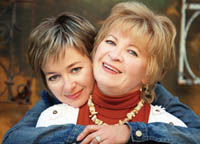Breast Cancer and the Genetic Link
The numbers are alarming. The American Cancer Society estimates that 211,300 new cases of breast cancer will be diagnosed this year in the United States; of those, 3,800 will be in Louisiana alone. And for women who have a family history of breast cancer, those numbers are frightening.
 It isn’t yet known exactly what causes breast cancer, but certain risk factors are clearly linked to the disease. Most women who develop breast cancer have no identifiable risk factors other than their gender. The growth of breast cancer tumors is often affected by the presence of estrogen and progesterone. Risk factors—such as having a first pregnancy after age 30, menstruation before age 12, menopause after 50, long-term hormone replacement therapy (more than five years), and nulliparity (having never given birth)—result from exposure to these hormones. Other risk factors include having a family history of the disease (a mother or sister with premenopausal breast cancer), a genetic link, a history of breast biopsy or radiation treatment to the chest, alcohol use (two to five drinks daily) and obesity.
It isn’t yet known exactly what causes breast cancer, but certain risk factors are clearly linked to the disease. Most women who develop breast cancer have no identifiable risk factors other than their gender. The growth of breast cancer tumors is often affected by the presence of estrogen and progesterone. Risk factors—such as having a first pregnancy after age 30, menstruation before age 12, menopause after 50, long-term hormone replacement therapy (more than five years), and nulliparity (having never given birth)—result from exposure to these hormones. Other risk factors include having a family history of the disease (a mother or sister with premenopausal breast cancer), a genetic link, a history of breast biopsy or radiation treatment to the chest, alcohol use (two to five drinks daily) and obesity.
Many women with breast cancer are concerned that they may have an inherited form of breast cancer. Unaffected women may also worry that because of their family history of breast cancer, they too may develop it. However, most breast cancers do not occur through inherited mutations. Only 5% to 10% of all cases have a genetic link that results from an inherited mutation in genes identified as BRCA1 and BRCA2. Patients who inherit an altered BRCA1 or BRCA2 gene have an increased risk for developing premenopausal breast cancer and are more likely to have family members with the condition. Yet, even if a woman has a mutated gene, it does not mean she is certain to develop cancer.
Because breast cancer is so common, many women have someone in their family with breast cancer. In looking at family history, it’s important to consider the number of relatives with breast cancer, how many first-degree relatives have or have it, and the age of diagnosis. The following characteristics could indicate that breast cancer is associated with an inherited predisposition. Not everyone with one or more of these characteristics has a hereditary form of breast cancer.
- Women who developed breast cancer before 50 years of age or before menopause
- Women who have two or more relatives with breast cancer diagnosed before age 50
- Women with bilateral breast cancer
- Women who have both breast and ovarian cancer
- Women with breast cancer with a family history of ovarian cancer
- Individuals with a personal or family history of male breast cancer
- Ashkenazi ancestry with family history of breast cancer
It’s now possible to test for some mutations in genes that increase the risk of breast cancer. Genetic testing may be suitable for some families whose history suggests a potentially high risk of developing breast cancer. Women from these rare families can have a test to find out if they have inherited a mutation in the BRCA1 and BRCA2 gene. Having the test, with the support of genetic counseling, may help your doctor plan a personal management program for you, designed to detect and/or prevent cancers that may arise at their earliest stages.
Interested women can be referred to a genetic counselor by their doctor. Genetic counseling is a process that includes history taking, risk assessment, education, emotional support and help with making a decision about possible testing. There are many important issues that should be considered before having genetic testing. Some of them include the fact that a positive result does not mean that you will definitely develop breast cancer, as well as the fact that a negative result does not guarantee that you will not get breast cancer. It is essential to remember that finding out your genetic risk of breast cancer can have important implications for other members of your family who may find that they are at an increased risk.
For additional information or to arrange an appointment, contact the Hereditary Breast and Ovarian Cancer Risk Assessment Clinic at the Lieselotte Tansey Breast Center at Ochsner at 504-842-2565 or 504-842-6406.
